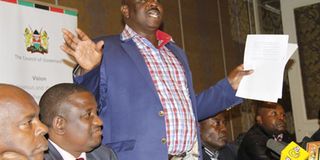Scenarios in the event of a referendum being held

Council of Governors chairman Isaac Ruto (standing) addresses the media on August 8, 2014. Governors are fighting for control of casinos, betting and other gambling business in the counties. PHOTO | NATION MEDIA GROUP
What you need to know:
- Options: Jubilee can decide to oppose, to remain passive, to support or to kick off its own referendum.
- Nigeria offers good lessons about revenue sharing which might be useful for those considering the possibility of a referendum.
It looks increasingly likely that Kenya will have a referendum. A group of governors has now announced that they will stage a referendum to increase their share of the national revenue from the current minimum of 15 per cent to 45 per cent.
Already, the Okoa Kenya movement had announced plans for a referendum of their own which has the same aims and other reforms, including that of the Independent Electoral and Boundaries Commission.
With the referendum a greater possibility now than before, the main political actors may need to make a number of strategic decisions in the coming days.
These include the Jubilee Government, the official opposition Cord, and the governors. At this stage, Jubilee is opposed to a referendum and has warned that any of its governors supporting a referendum will be deemed to be working for the Opposition.
The government has also moved to neutralise the possibility of a referendum by increasing the share of revenue for the counties from 15 per cent to 43 per cent of the audited accounts, as if to say that the increases sought can be achieved without resorting to a referendum.
If, notwithstanding its opposition, a referendum takes place, Jubilee must decide what position to take in that event. Jubilee can decide to oppose, to remain passive, to support, or to kick off its own referendum. There are advantages and risks in any of these potential positions, and Jubilee must weigh each of them carefully.
WORKING SEPARATELY
Both Okoa Kenya and the governors also have decisions to make.
At the moment, each group is working on its own, even though they share the aspiration of increased revenue for counties to be achieved through a referendum. In the coming days, they must decide whether to continue working separately, or to join efforts.
There are slight differences in the issues they are interested in. For example, governors are also concerned about their own constitutional status which, in various forms, has come under attack from the National Assembly, and lately the Senate, and may seek to secure this through a constitutional amendment.
On its part, Okoa Kenya is concerned about the reform of electoral arrangements and the Judiciary.
Decisions will need to be made on whether to work together and, if so, how this can be done.
It looks unwise for the two not to work together given the obvious boost that this would give to the referendum push. For one, working together would increase their appeal and the chances of success.
Second, an alliance would give the referendum the grassroots support that Cord has in its strongholds, and which Jubilee governors who support the referendum will lack. Such support will be important in gathering signatures.
Other than these actors, some groups outside politics have constitutional grievances of their own, and which may have to decide whether a referendum can provide an opportunity to put their issues on the referendum ticket.
For example, the women’s movement, unhappy about an unmet constitutional quota for gender representation in the Legislature, may decide that a referendum can offer them a chance for increased representation through a constitutional amendment.
The results of the 2013 elections missed the constitutional quota by a wide margin. It is now clear that nothing, other than a constitutional amendment, can fulfil the requirement on gender equity. If the women’s movement joined the referendum call, this would further widen its base and increase chances of success.
LESSONS FROM NIGERIA
Nigeria offers good lessons about revenue sharing which might be useful for those considering the possibility of a referendum. Nigeria divides its national revenue into three: 52 per cent for the federal government, 26.7 per cent for the states and 20.6 per cent for the local governments.
While the principles for determining revenue sharing are in the constitution, the actual percentage share is left to the National Assembly. This means that Nigeria does not have to amend the constitution each time it seeks to change the portions for each tier of government.
Second, as Nigeria’s case has shown, revenue sharing issues change very significantly with the discovery of natural resources. While at independence revenue from oil, which was small, belonged to regions where it was produced, the need to change this position became more apparent with the increased share of oil as a source of financing the national budget.
Currently, 80 per cent of Nigeria’s national budget derives from oil, making it the most important resource for both the federal and state governments. There are significant oil politics between all levels of government and, particularly, between the federal government and the oil producing states.
Kenya has discovered natural resources including oil and gas, which may become available for exploitation in the coming years. One possibility is to use the referendum to provide broad principles that address revenue sharing issues in such a manner that there will not need to be another referendum in future merely to address windfalls that may arise from Kenya’s recent discoveries.
Groups which, in principle, oppose a referendum will also have to decide whether to suggest ideas to improve the referendum question since, if successful, the results will bind them, or sit back in the hope that they will have the numbers to defeat the referendum in a vote.





